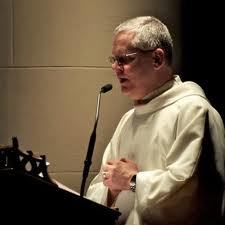A Problem of Translation?
Devra Torres | Sep 24, 2013 | 11 cmts
When my husband mentions that he teaches business ethics, one occasional comeback is, “Isn’t that an oxymoron?”
In fact, it’s not. Business is not an intrinsic evil. And, as the Occupy movement unintentionally made clear, it’s incoherent to bash corporations in general while gobbling up the goods and services they offer so as to enhance your anti-business hipster chic.

But teaching ethics to MBA types has its challenges. It’s not that they can’t understand truths about good and evil, virtue and vice. It’s just that they can’t hear those truths at all—unless you express them in a language they can understand. You can’t be preachy,

but not only that—you can’t express anything in a way that hints of preachiness. You want to be exceedingly careful with words like service (or, for that matter, ethics). My husband (I could be biased) happens to be extraordinarily good at this sort of “translation” and has witnessed many of what you could call conversions by people who were suddenly able to see beyond measurable phenomena for the first time.

In the same way, the Church needs to speak to her prodigal sheep in a language they can hear. I think Pope Francis is seeking to do this. We can argue about whether he’s succeeding, but I think that kind of “success” may be far trickier to measure than we assume.

Besides, just as the straying, belligerent, messed-up, lost sheep of the 21st century can misinterpret the language of objective moral norms as heartless judgmentalism, so the more faithful, stable, dedicated sheep can mishear the language of mercy as the sound of someone (maybe unconsciously) watering down the Faith, capitulating to the spirit of the world, shying away from unpopular moral stances. They see clearly that the Pope would only be harming his obviously beloved lost sheep by going down that path.

And many feel a little baffled by the emphasis, the seeming dismissal of all their efforts all these years. As my dear friend Nancy put it the other night,
I agree with the focus being on the prodigals, yes, yes, yes; but the elder brother's faithfulness can be honored too. Maybe not with a whole calf; just a hoof or something...

One way or another, though, we’re all hard of hearing, less multilingual than we imagine.
I ran into two articles that express especially well what I think Pope Francis is seeking to do: The Pope’s Powerful Outreach to a Prodigal People, by Deacon Greg Kandra,

and The Love Comes First, by Dwija, who blogs at House Unseen (life unscripted

Then again, I’ve known lots of people who were wandering around in left field, spiritually speaking, and then were drawn to and even converted by a straightforward appeal to moral norms and unapologetic truth claims.
So what do we speak? The language of mercy or the language of doctrine? Love or dogma? Who's the audience here? What's our strategy?
I think there's no one-size-fits-all answer. I think our best bet is to consult the Holy Spirit, the undoer of the curse of Babel. Then maybe we'll be able to hear each other again.


Comments (11)
Sapperdepitjes
Sep 26, 2013 5:56am
In all this hubbub that followed the interview of Pope Francis, many seem to forget that salvation is a grace and doesn't proceed from law, divine or human. Divine law is a means to express love, not an end in itself. In the end, the repenting sinner is saved, and the unloving complier is condemned.
Patrick Dunn
Sep 26, 2013 11:28am
I'm grateful for this post, Devra. We are facing difficult questions:
"So what do we speak? The language of mercy or the language of doctrine? Love or dogma? Who's the audience here? What's our strategy?"
I don't know if it was ever any differnet, but Pope Francis has, it seems, brought them to the surface in a powerful way. I do not think there are easy answers.
It is a struggle because some are basically saying "all we need is love" (or that the Pope is saying that) which I know he is not, and can not, for that matter. Gentle Francis vs. Rigid Benedict and all that.
But isn't the truth that Jesus, in Scripture, is both merciful and unapologetic about Truth - about His own identity and centrality especially? We seem to be getting one side of Jesus or another, but not the full Jesus. If all we need is love, then His other demands and warnings are what? Hot air?
He forgives us if we repent. He is always loving and always calling us to faithfulness, not having come to abolish the Law.
Devra Torres
Sep 26, 2013 3:30pm
Sapperdepitjes, no one would guess English isn't your native language! "Hubbub"--exactly/!
Yes, there's a good point that Fr. John Riccardo makes: every schoolchild should learn the Ten Commandments, but no one should grow up ignorant of the context: that they're a gift, to rescue them from wandering around in the dessert forever, lawless, without a "light to their path." There's even a Jewish feast called Simchat Torah: Rejoicing in the Law.
Sapperdepitjes
Sep 26, 2013 4:02pm
I actually just passed a friends' facebook quote through Google Translate :-)
http://www.facebook.com/donjoan.carreras
Always beware of pelagianism. Ours is a love affair!
Did I recommend you this book?
La foi des démons, Ou l'athéisme dépassé, Fabrice Hadjadj
http://en.wikipedia.org/wiki/Fabrice_Hadjadj
http://www.amazon.com/Fabrice-Hadjadj/e/B004MS1LL8
I don't know if it has been translated yet to English. It exists in Spanish:
http://www.amazon.es/los-demonios-ateismosuperado-FABRICE-HADJADJ/dp/8493899739/
Devra Torres
Sep 26, 2013 9:01pm
Patrick, yes: the world is full of politicians and their hangers-on, and they're all looking for a strategy and a poll-tested way to use language to appeal to this or that constituency. What the Pope is doing, and what we're all supposed to be doing, is something of another order altogether. We're not picking a strategy; we're trying to let Jesus shine through us.
Of course, we need to be aware of our audience, and how they're likely to interpret us. We have to be "wise as serpents." We can't walk into a room of MBA's and speak to them as if they were a ladies' rosary society.
But we can't judge our success or failure on the obvious fallout, the willful or honest misunderstandings, the Pope's "approval numbers." I heard a liberal Jesuit on the radio exulting over the "approval ratings" that he said politicians would kill for; I've heard others point to those same "ratings" as evidence that he's on the wrong track, becasue, after all, it says in the Bible, Woe to you when all men speak well of you. I bet more (good) invisible things are going on here than we know about.
Devra Torres
Sep 26, 2013 10:10pm
Sapperdepitjes: not to mention: always beware of plagarism!
I do have that book in Spanish--it came highly recommended by Chema Postigo--though I haven't read it yet. Thanks for reminding me.
Kate Whittaker Cousino
Sep 26, 2013 10:36pm
Not so invisible, Devra. I'm on a large forum where we've been discussing this, and you would not believe the number of people who have said that the left the Church--or have been on the verge of leaving--because they felt unwelcome as 'bad Catholics' who struggled with some of the Church's teachings. They felt that 'good Catholics' would rather they go to hell than continue to attend mass while contracepting or voting for the 'wrong party'. So they stopped going to mass.
Well, a number of those people have expressed hope that there might be a place for them in the Church after all, if Francis' message is listened to. Not because they necessarily think that he's going to change any teachings either. Just because they feel *wanted* and cared about when he speaks.
Devra Torres
Sep 26, 2013 11:44pm
I believe it! And I have the impression that that's especially true in other parts of the world, maybe especially in Latin America and the Phillipines. I think sometimes people are too quick to assume that "liberal" Catholics like him because they think he's about to change all the rules. A lot of people preface their criticism by saying they believe he's being led by the Holy Spirit, and he's what the Church needs now, but there's no evidence in what they say next that they're quite sure of it.
Katie van Schaijik
Sep 27, 2013 4:28am
Devra, I love your point that we "on the right" might be as apt to misinterpret "the language of mercy" as implying relativism, as those "on the left" are to misinterpret "the language of truth" as implying condemnation and hardness of heart.
James Barclay
Sep 27, 2013 8:42pm
Rev. Richard Wurmbrand said "A bird is not one of its wings" and I won't say a religion has a Right or a Left wing. If someone wants to introduce factionalism I suppose that is his or her business. But attaching such wholesale political assignments, to me, is a part of de-personalization and a part of social propagandizing. In fact, its right out of the book "Propaganda". If someone thinks his or her religion is not beyond that it probably means that we have no common ground because of it. I just won't be entrapped by it.
Devra Torres
Sep 27, 2013 9:38pm
Yes, Katie did put "on the right" and "on the left" in quotation marks. The limits of labels that belong not in religion but in politics, if anywhere, really struck me when Pope Francis was first elected, and I wrote about it here.